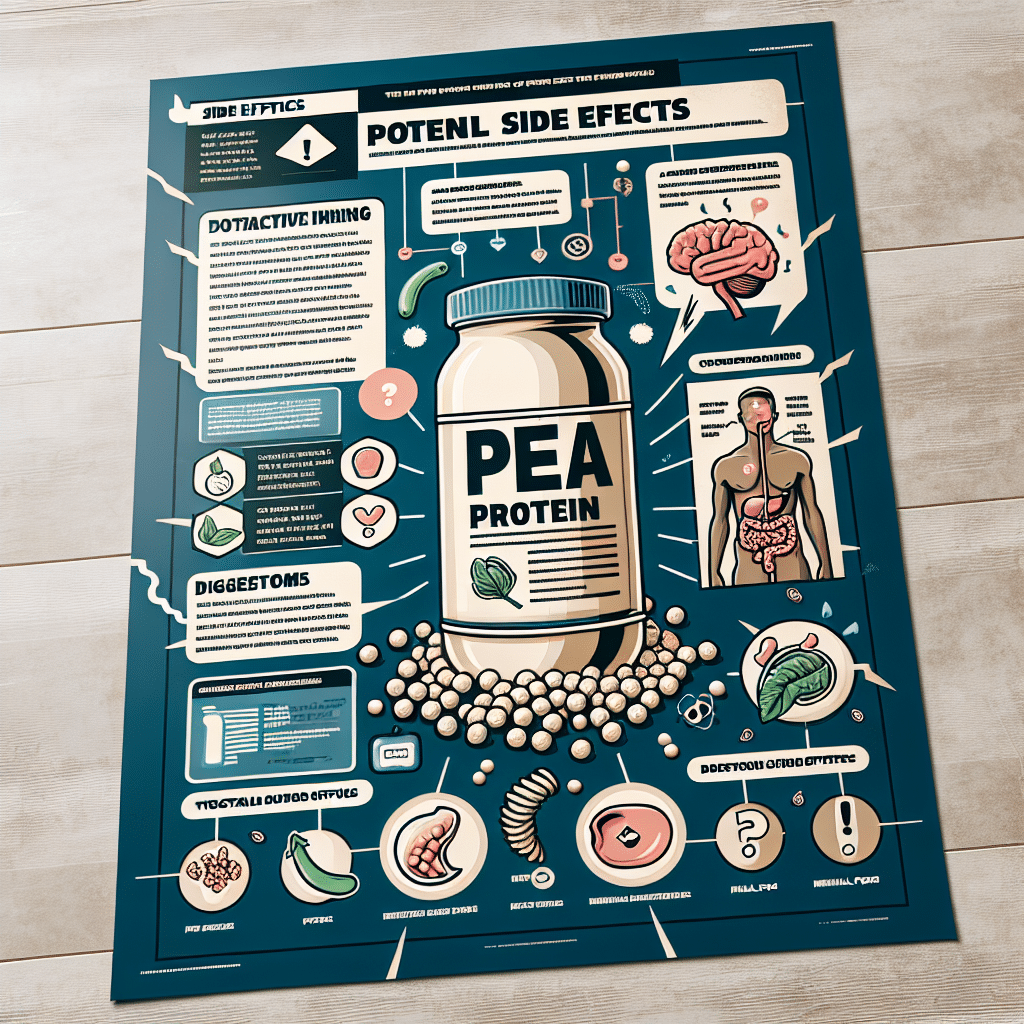Side Effects of Pea Protein: What You Need to Know
-
Table of Contents
Side Effects of Pea Protein: What You Need to Know

Pea protein has gained popularity in recent years as a plant-based alternative to animal-based protein sources. It is derived from yellow peas and is known for its high protein content, low allergenicity, and sustainability. However, like any dietary supplement, pea protein may have side effects that individuals should be aware of before incorporating it into their diet. In this article, we will explore the potential side effects of pea protein and provide valuable insights to help you make an informed decision.
1. Digestive Issues
One of the most common side effects of pea protein is digestive issues. Some individuals may experience bloating, gas, or stomach discomfort after consuming pea protein. This can be attributed to the high fiber content of peas, which can be difficult for some people to digest. Additionally, pea protein contains oligosaccharides, a type of carbohydrate that can cause gas and bloating in certain individuals.
To minimize digestive issues, it is recommended to start with a small serving of pea protein and gradually increase the amount over time. Drinking plenty of water and ensuring adequate fiber intake from other sources can also help alleviate digestive discomfort.
2. Allergic Reactions
While pea protein is generally considered hypoallergenic, some individuals may still experience allergic reactions. Pea protein is derived from peas, which belong to the legume family. Individuals with a known allergy to legumes, such as peanuts or soybeans, may also be allergic to pea protein.
Symptoms of an allergic reaction to pea protein may include hives, itching, swelling, difficulty breathing, or gastrointestinal distress. If you experience any of these symptoms after consuming pea protein, it is important to seek medical attention immediately.
3. Heavy Metal Contamination
Another potential concern with pea protein is heavy metal contamination. Peas, like other plants, can absorb heavy metals from the soil in which they are grown. While reputable manufacturers conduct rigorous testing to ensure the safety and quality of their products, there is still a possibility of trace amounts of heavy metals in pea protein.
To minimize the risk of heavy metal contamination, it is important to choose pea protein from trusted sources that prioritize quality control and testing. Look for products that have been tested for heavy metals and meet industry standards for safety.
4. Interference with Medications
Pea protein contains certain compounds that may interfere with the absorption or effectiveness of certain medications. For example, pea protein contains phytic acid, which can bind to minerals like iron, zinc, and calcium, reducing their bioavailability.
If you are taking medications that require optimal mineral absorption, it is advisable to consult with your healthcare provider before incorporating pea protein into your diet. They can provide guidance on potential interactions and help you make an informed decision.
5. Hormonal Effects
Some individuals may be concerned about the potential hormonal effects of pea protein. Pea protein contains phytoestrogens, which are plant compounds that can mimic the effects of estrogen in the body. While the phytoestrogen content in pea protein is relatively low compared to other plant-based protein sources like soy, it is still a consideration for individuals with hormone-sensitive conditions.
If you have a hormone-sensitive condition or are taking medications that affect hormone levels, it is advisable to consult with your healthcare provider before consuming pea protein. They can provide personalized advice based on your specific health needs.
Summary
Pea protein is a popular plant-based protein source that offers numerous health benefits. However, it is important to be aware of the potential side effects before incorporating it into your diet. Digestive issues, allergic reactions, heavy metal contamination, interference with medications, and hormonal effects are some of the possible side effects of pea protein.
To minimize the risk of side effects, it is recommended to start with a small serving of pea protein and gradually increase the amount over time. Choosing pea protein from trusted sources that prioritize quality control and testing can also help ensure safety. If you experience any adverse reactions after consuming pea protein, it is important to seek medical attention.
About ETprotein
ETprotein, a reputable protein Chinese factory manufacturer and supplier, is renowned for producing, stocking, exporting, and delivering the highest quality organic bulk vegan protein and plant proteins. They include Organic rice protein, clear rice protein, pea protein, clear pea protein, pumpkin seed protein, sunflower seed protein, mung bean protein, etc. Our offerings, characterized by a neutral taste, non-GMO, allergen-free attributes, cater to a diverse range of industries. We serve nutraceutical, pharmaceutical, cosmeceutical, veterinary, as well as food and beverage finished product distributors, traders, and manufacturers across Europe, USA, Canada, Australia, Thailand, Japan, Korea, Brazil, and Chile, among others.
Our specialization includes exporting and delivering tailor-made protein powder and finished nutritional supplements. Our extensive product range covers sectors like Food and Beverage, Sports Nutrition, Weight Management, Dietary Supplements, Health and Wellness Products, and Infant Formula, ensuring comprehensive solutions to meet all your protein needs.
As a trusted company by leading global food and beverage brands and Fortune 500 companies, ETprotein reinforces China’s reputation in the global arena. For more information or to sample our products, please contact us and email sales(at)ETprotein.com today.












